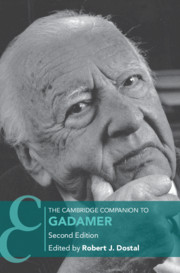Book contents
- The Cambridge Companion to Gadamer
- Other Volumes in the Series of Cambridge Companions
- The Cambridge Companion to Gadamer
- Copyright page
- Contents
- Contributors
- Abbreviations
- Introduction
- 1 Gadamer (1900–2002)
- 2 Gadamer’s Basic Understanding of Understanding
- 3 Getting It Right
- 4 Philosophical Hermeneutics, Language, and the Communicative Event
- 5 Phronesis and Solidarity
- 6 Gadamer’s Herderian Critics
- 7 Gadamer on the Human Sciences
- 8 Art Experience and Its Transformative Potential in Gadamer’s Hermeneutics
- 9 Lyric as Paradigm
- 10 Gadamer, the Hermeneutic Revolution, and Theology
- 11 Hermeneutics in Practice
- 12 Gadamer’s Hegel
- 13 Gadamer’s Relation to Heidegger and to Phenomenology
- 14 The Constellation of Hermeneutics, Critical Theory, and Deconstruction
- 15 Hermeneutics in a Broader Horizon
- Bibliography
- Index
- Other Volumes in the Series of Cambridge Companions (continued from page ii)
10 - Gadamer, the Hermeneutic Revolution, and Theology
Published online by Cambridge University Press: 29 July 2021
- The Cambridge Companion to Gadamer
- Other Volumes in the Series of Cambridge Companions
- The Cambridge Companion to Gadamer
- Copyright page
- Contents
- Contributors
- Abbreviations
- Introduction
- 1 Gadamer (1900–2002)
- 2 Gadamer’s Basic Understanding of Understanding
- 3 Getting It Right
- 4 Philosophical Hermeneutics, Language, and the Communicative Event
- 5 Phronesis and Solidarity
- 6 Gadamer’s Herderian Critics
- 7 Gadamer on the Human Sciences
- 8 Art Experience and Its Transformative Potential in Gadamer’s Hermeneutics
- 9 Lyric as Paradigm
- 10 Gadamer, the Hermeneutic Revolution, and Theology
- 11 Hermeneutics in Practice
- 12 Gadamer’s Hegel
- 13 Gadamer’s Relation to Heidegger and to Phenomenology
- 14 The Constellation of Hermeneutics, Critical Theory, and Deconstruction
- 15 Hermeneutics in a Broader Horizon
- Bibliography
- Index
- Other Volumes in the Series of Cambridge Companions (continued from page ii)
Summary
This chapter considers the third great turning point in the development of hermeneutics in Western culture. The first hermeneutics was a hermeneutics of consent. This was developed in early Christianity and by Augustine. The second turning point was in the modern Enlightenment with its classic expression by Spinoza. This is the hermeneutics of suspicion. The third turning point was inaugurated by Barth and Heidegger. Gadamer provides its fundamental book, Truth and Method. This hermeneutics may be called integral hermeneutics, which incorporates the first two turning points. This chapter considers the hermeneutics of Heidegger in its relation to Aristotle. This is followed by a consideration of Gadamer’s hermeneutics with a focus on the central role of phronesis, which shows the relevance of Aristotle. Conversation is also central to Gadamer’s hermeneutics. The chapter finally shows the relevance of Gadamer’s hermeneutics to Christian theology.
- Type
- Chapter
- Information
- The Cambridge Companion to Gadamer , pp. 242 - 281Publisher: Cambridge University PressPrint publication year: 2021

